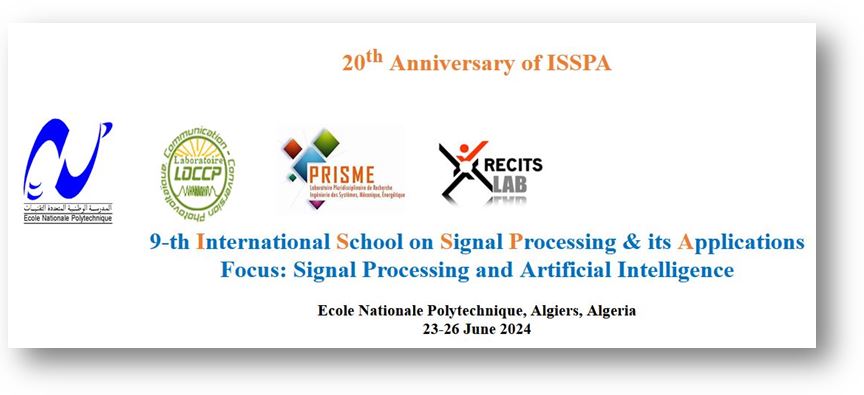ISSPA 2024 Partner


Honorary General Chair
Prof. Abdelouahab MEKHALDI, Ecole Nationale Polyetchnique, Algeria
General Chair
Prof. Adel BELOUCHRANI, Ecole Nationale Polyetchnique, Algeria
Advisory Board
Prof. Adel BELOUCHRANI, Ecole Nationale Polytechnique, Algeria
Prof. Karim ABED-MERAIM, University of Orleans, France
Prof. Nguyen LINH TRUNG, Vietnam National University, Vietnam
Background
The 9-th Edition
The International School on Signal Processing and its Applications has been set up in 2004 to promote signal processing research activities in developing countries, starting with the Maghreb region. This school is dedicated to signal and image processing research. It is a forum that gathers leading researchers and postgraduate students from universities and industrial groups involved in the development of new applications and/or carrying out common research projects.
The first edition of the school took place at Ecole Nationale Polytechnique (ENP), Algiers, in 2004. It has been followed by 5 successive editions organized in Mostaghanem (2005), Jijel (2006), Boumerdes (2007), Kuala Lumpur (Malaysia 2008), and Oran (2009), respectively. After that, the organisation of this thematic school has been resumed in 2017 where it has been organized at the University of Guelma followed by the last edition organized at the University of Annaba in 2019. Several areas related to signal processing are of interest and have been the focus of previous issues.
The focus of this 9-th edition will be on Signal Processing and Artificial Intelligence. Indeed, AI became in the last recent years one of the hottest topics in data science including signal processing.
This new edition celebrates the 20th Anniversary of ISSPA at Ecole Nationale Polytechnique, Algiers, Algeria, and its first place!
Submission Deadline: 15 April 2024
New Submission Deadline: 30 April 2024
Acceptance Notification: 8 May 2024
Accepted candidates will present
their research work at a POSTER session
:Organizing Committee
Prof. Hacéne BELBACHIR, University of Science and Technology Houari Boumediene, Algeria
Dr. Nesrine BOUADJENEK, Ecole Nationale Polyetchnique, Algeria
Ouiza SATOUR, Ecole Nationale Polyetchnique, Algeria
Souhila KOUICI, Ecole Nationale Polyetchnique, Algeria
Mahieddine DOUADI , Ecole Nationale Polyetchnique, Algeri
Abdelkrim SAHEB, Ecole Nationale Polyetchnique, Algeria
Elies SAADAOUI, Ecole Nationale Polyetchnique, Algeria
Mohamed TAGHI, Ecole Nationale Polyetchnique, Algeria
Sabiha BELOUED, Ecole Nationale Polyetchnique, Algeria
:Detailed Program
| Wednesday 26 June | Tuesday 25 June | Monday 24 June | Sunday 23 June |
| 8:00 am – 8:30 am | |||
| Registration | |||
| 8:30 am – 9:00 am | |||
| Opening Ceremony | |||
| 9:00 am – 10:30 am | 9:00 am – 10:30 am | 9:00 am – 10:30 am | 9:00 am – 10:30 am |
| Lecture 7 | Lecture 5 | Lecture 3 | Lecture 1 |
| Signal and Information Processing Methods for Brain Studies | Large Language Models: Challenges and Opportunities | Divide-and-Conquer Posterior Sampling for Denoising Diffusion Priors | Artificial intelligence and its applications |
| (Prof. Nguyen Linh Trung, VNU, Vietnam) | (Prof. Mèrouane Debbah, Khalifa University, UAE) | (Prof. Eric Moulines, Ecole Polytechnique, Paris, France) | (Prof. Sid-Ahmed Berrani, National School of Artificial Intelligence – Sidi Abdallah) |
| 10:30 am – 11:00 am | 10:30 am – 11:00 am | 10:30 am – 11:00 am | 10:30 am – 11:00 am |
| Coffee Break | Coffee Break | Coffee Break | Coffee Break |
| 11:00 am – 12:30 pm | 11:00 am – 12:30 pm | 11:00 am – 12:30 pm | 11:00 am – 12:30 pm |
| Closing ceremony | Lecture 6 | Lecture 4 | Lecture 2 |
| Source Separation: Model driven versus Data driven approaches | Tensor decomposition for neural network | Graph theory and its Applications | |
| (Prof. Adel Belouchrani, ENP, Algeria) | (Prof. Karim Abed-Meraim, University of Orleans, France) | (Prof. Hacéne Belbachir, USTHB, Algeria) | |
| 12:30 pm – 1:30 pm | 12:30 pm – 1:30 pm | 12:30 pm – 1:30 pm | |
| Lunch | Lunch | Lunch | |
| 2:00 pm – 4:00 pm | |||
| Poster Session | Social Activity | Poster Session | |
Summaries and speaker’s short biographies
Speaker 1: Prof. Sid-Ahmed BERRANI, National School of Artificial Intelligence, Sidi Abdallah, Algeria

Artificial intelligence and its applications
Speaker 2: Prof. Hacéne BELBACHIR, University of Science and Technology Houari Boumediene, Algeria

Graph theory and its applications
Speaker 3:Prof. Eric MOULINES, Ecole Polytechnique, Paris, France

Divide-and-Conquer Posterior Sampling for Denoising Diffusion Priors
Bibliography:Eric Moulines earned a degree in engineering (1984) from the Ecole Polytechnique, and a PhD in electrical engineering (1990) from the Ecole Nationale Supérieure des Télécommunication. In 1990, he joined the Signal and Image Processing Department at Télécom ParisTech, where he was appointed full professor in 1996. In 2015, he joined the Centre for Applied Mathematics at Ecole Polytechnique, where he is currently Professor of Statistics. His areas of expertise include computational statistics (Monte Carlo simulations, stochastic optimization), probabilistic machine learning, statistical signal processing and time series analysis (sequential Monte Carlo, non-linear filtering). His current research topics include high-dimensional Monte Carlo sampling, stochastic optimization, and generative models (variational autoencoders, generative adversarial networks). He applies these different methods to uncertainty quantification, Bayesian inverse problems, and the control of complex systems. He has published more than 120 articles in leading journals in the areas of signal processing, computational statistics and applied probability and more than 300 proceedings papers in major signal processing and machine learning conferences. In 1997 and 2006, he received the Best paper Award from the IEEE Signal Processing Society (for publications in IEEE Trans. On Signal Processing). He has served on the editorial boards of IEEE Trans. On Signal Processing, Signal Processing, Stochastic Processes and Applications, Journal of Statistical Planning and Inference, Electronic Journal of Statistics. From 2013-2016, he was the Editor-in-Chief of Bernoulli. E. Moulines is a EURASIP and IMS Fellow. He was awarded the Silver Medal of the Centre National de Recherche Scientifique in 2010 and the Orange Prize of the French Academy of Sciences in 2011. In 2016, he was a Fellow of the IMS. In 2020, he received the technical achievement award from EURASIP. In 2017, he was elected to the Academy of Sciences.
Speaker 4:Prof. Karim ABED-MERAIM, University of Orleans, France

Tensor decomposition for neural network
The era of “Big Data”, which deals with massive datasets, has brought new analysis techniques for discovering new valuable information hidden in the data. Among these techniques is multilinear low-rank approximation (LRA) of matrices and tensors, which has recently attracted a lot of attention from engineers and researchers in the signal processing and machine learning communities. A tensor is a multidimensional array and provides a natural representation of high-dimensional data. Low-rank approximation of tensors (t-LRA) can be considered as a multiway extension of LRA of matrices (which are two-way) to higher dimensions. Generally, t-LRA is referred to as tensor decomposition, which allows factorizing a tensor into a sequence of basic components. As a result, t-LRA provides a useful tool for dealing with several large-scale multidimensional problems in modern data analysis, which would be, otherwise, intractable by classical methods. In this lecture, a brief review of different tensor concepts and different tensor decomposition algorithms with illustrative application examples is first provided. Then, we focus on the application of tensor decomposition for model reduction in neural network and deep learning
Speaker 5:Prof. Mèrouane DEBBAH, Khalifa University, UAE

Large Language Models: Challenges and Opportunities
Speaker 6: Prof. Adel BELOUCHRANI, Ecole Nationale Polytechnique, Algeria

Source Separation: Model driven versus Data driven approaches
Speaker 7: Prof. Nguyen LINH TRUNG, VNU, Vietnam

Signal and Information Processing Methods for Brain Studies
Recent advances in signal processing and machine learning have led to opportunities and challenges in brain studies. In this talk, we will present several research studies targeting three brain conditions: epilepsy, cognitive conflict, and Alzheimer’s disease. The first study, for epilepsy, develops a multi-stage system for single-channel EEG-based epileptic spike detection and a tensor decomposition method for multi-channel spike detection. The second study selects special computer-vision methods for EEG-based peak detection in cognitive conflict processing. The third study applies machine-learning methods for PET-based feature extraction and data-driven brain atlas construction in classification of Alzheimer’s disease. The fourth study applies machine-learning methods for MRI-based feature extraction in prediction of pathways between multivariate brain areas and multivariate disease/behavior outcomes.
